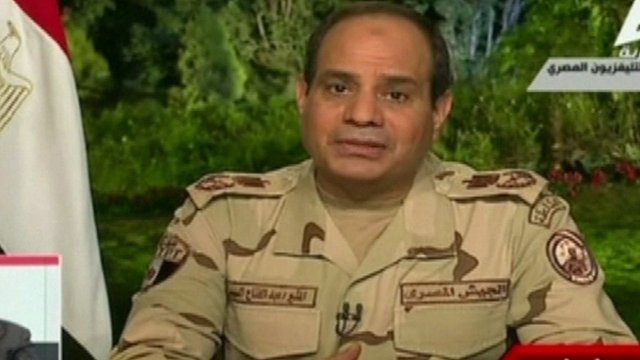
The BBC’s Orla Guerin: “Sisi has the institutions of state behind him” Field Marshal Abdul Fattah al-Sisi has announced that he has resigned as Egypt’s military chief in order to stand for the presidency. In a widely expected announcement, he said on state TV he was appearing “in my military uniform for the last time”. Field Marshal Sisi led the overthrow of Islamist President Mohammed Morsi in July after mass opposition protests. Correspondents say he is likely to win the presidency, given his popularity and the lack of any serious rivals. Analysis Orla Guerin BBC News, Cairo Abdul Fattah al-Sisi has surprised no-one by announcing his farewell to arms. His exit from Egypt’s military was carefully choreographed over a period of months. In or out of uniform he will be viewed as the military’s man. Just three years after the revolution – which was supposed to end decades of military rule – Egypt’s generals are again supplying the country’s leader. The softly spoken former intelligence chief – with no combat experience – will now have to fight on several fronts. He will inherit a bitterly divided nation, a crippled economy and a growing insurgency. Diplomatic sources say he is a reluctant candidate who is well aware of the pitfalls ahead. One problem he won’t have is winning. Sisi enjoys huge support, and so far has no serious challengers. Some potential candidates have refused to run saying the opposition can’t campaign freely and the election will be a farce. Analysts warn that Sisi’s strong support could wane if he can’t make progress fast. To his supporters, the 59-year-old former army chief is a saviour who can end the political turmoil dogging Egypt since 2011 when a popular uprising ended Hosni Mubarak’s three decades of one-man rule. But his opponents hold him responsible for what human rights groups say are widespread abuses, and fear that he wants a return to authoritarianism. His announcement came hours after Egypt’s interim authorities ordered the prosecution of 919 suspected Islamists and days after 528 were sentenced to death in a separate case. ‘Difficult task’ In his address, Field Marshal Sisi told Egyptians he first wore his military uniform as a 15-year-old cadet and said: “I will always be proud of wearing the uniform of defending my country.” But he said he was answering “the demand of a wide range of Egyptians who have called on me to run for this honourable office”. He warned of an “extremely difficult task” ahead for Egyptians as the country faces up to its “economic, social, political and security realities”, including a threat “by the terrorists”. But he proposed “hard work and self-denial”. “If I am granted the honour of the leadership,” he said, “I promise that we together, leadership and people, can achieve stability, safety and hope for Egypt”. BBC News profiles the man some are calling Egypt’s president-in-waiting The starting date of the nomination process for the presidential election will reportedly be announced on Sunday, after which no changes may be made to the electoral roll. Born in Cairo on 19 November 1954 Graduated from Egypt’s Military Academy in 1977 Further training in UK and US Youngest member of the Supreme Council of the Armed Forces after 2011 uprising topples Hosni Mubarak Appointed commander-in-chief of armed forces and defence minister in 2012 by President Mohammed Morsi Overthrows Mr Morsi, suspends constitution and installs interim government in 2013 following mass opposition protests Promoted to field marshal in January 2014 New face of Egypt’s old guard The government has yet to set a date for the vote, although earlier this month al-Ahram newspaper cited interim President Adly Mansour as saying that it would be completed by 17 July. Leftist politician Hamdeen Sabahi, who came third in the 2012 election, is the only other candidate to have declared his intention to run. Gen Sedki Sobhi, the current chief-of-staff of the armed forces, is expected to be named Field Marshal Sisi’s successor. If Abdul Fattah al-Sisi becomes president, he will be the latest in a line of Egyptian rulers drawn from the military; a line only briefly broken during Islamist President Morsi’s year in office. Mr Morsi appointed Field Marshal Sisi as both military commander-in-chief and defence minister in August 2012 – a move seen at the time as an attempt to reclaim power from the military, which had assumed interim control after President Mubarak’s fall. But following mass protests a year later demanding the resignation of Mr Morsi and the Muslim Brotherhood-led government, it was Field Marshal Sisi who told the leadership to respond to “the will of the people” or risk army intervention. When Mr Morsi refused, Field Marshal Sisi suspended the constitution and announced the formation of a technocratic interim government. Since then, more than 1,000 people have been killed and thousands of members of Mr Morsi’s Muslim Brotherhood have been detained in a crackdown by the interim authorities, who have designated the Islamist movement a terrorist group. Mr Morsi and many other senior Brotherhood leaders are currently being tried on a variety of charges, including incitement to murder and conspiring to commit terrorist acts. —Sourece : BBC Online

